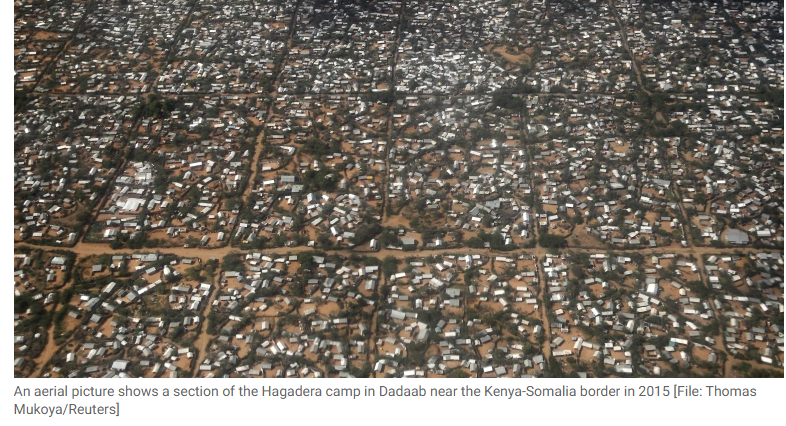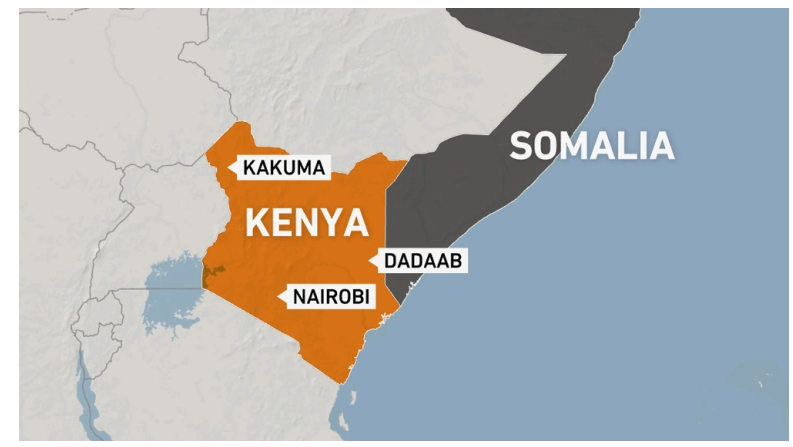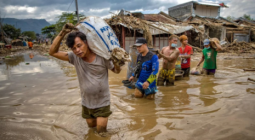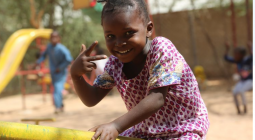‘No other home’: Refugees in Kenya camps devastated over closure.

Kenya has given an ultimatum to the UN refugee agency to present a plan over the closure of the Dadaab and Kakuma camps housing more than 400,000 people.
Terrifying, shocking, a rejection of humanity – these are just some of the words used by residents of Kenya’s two largest refugee camps to describe their fear and despondency over the news that the government is trying to have the settlements shut down imminently.
On March 24, Kenyan Interior Minister Fred Matiang’i declared the United Nations’ refugee agency (UNHCR) had two weeks to come up with a plan for closing the Dadaab and Kakuma camps, which between them host some 410,000 people from more than a dozen countries, including Somalis, South Sudanese, Ethiopians, Tanzanians, Ugandans and Burundians.
Otherwise, authorities warned, they would force refugees to travel to the border with Somalia. In a tweet, Kenya’s interior ministry called this an “ultimatum” and said there was no room for further negotiations.
“I don’t know if the [Kenyan] government have sat down and considered the lives of people living in the camp or they just wake up and make those decisions,” said Austin Baboya, a South Sudanese based in Kakuma. “Right now [across] the entire camp, the information has caused a panic and very many people have lost hope,” added Baboya, who, at 26, has not known any other home than a refugee camp.
In response to Kenya’s announcement, the UNHCR said it was grateful for the generosity of the Kenyan government for hosting so many refugees for so long (Dadaab was established some 30 years ago), but was “concerned about the impact this decision would have on the protection of refugees in Kenya, including in the context of the ongoing COVID-19 pandemic”.
The agency also said it would continue dialogue with the Kenyan authorities before the April 6 deadline and urged the government to “ensure that any decisions allow for suitable and sustainable solutions to be found and that those who continue to need protection are able to receive it”.

Kenya’s government previously tried to close Dadaab in 2016, after intelligence reports appeared to show that 2013 and 2015 attacks on Kenyan targets had links to the camps. The closure was blocked by Kenya’s high court.
“I felt devastated when I heard that the Kenyan government is threatening to shut down the two camps, said Hibo Mohamed, a 24-year-old from Somalia who has lived in Kakuma for 10 years.
She said she sees Somalia as an “unstable country which is still experiencing terror attacks over and over again”, adding that “Kakuma has become a home to me, where I found peace”.
‘Where will we go?’
Kakuma, home to more than 190,000 refugees, is located in Kenya’s northwest. Dadaab is in eastern Kenya, close to the Somali border, but many Somalis have moved between the two camps.
Life in both settlements can be difficult. The camps are remote, and refugees often complain about being trapped there without freedom of movement, along with high levels of corruption and poor services, but at least, they said, they are secure and many can access education or business opportunities.
“It’s very terrifying because we do not know the next step, like where are we going to go from here,” David Omot, an Ethiopian who has lived in both Kakuma and Dadaab since 2005, said of the closure order. “Where will we go? Back home we still have some insecurity, there are still some problems that people are facing, especially the youths.”
The 26-year-old said many people had lived there for 20 years or more, or even been born in the refugee camps. They did not have property in the countries they fled. He also worried about young refugees who were studying in Kenya. “It would be quite difficult for them to go back and start life afresh,” he said.
Noel Bol is one of them. “I came here with nothing, and I’m now a journalist because I was able to get the opportunity to go to school, learn and achieve my dreams, and I’m now doing something for the community,” said the 26-year-old South Sudanese who has lived in Kakuma for some 20 years.
Back in South Sudan, he believes there are much fewer educational opportunities. He worried that children that returned could start picking up guns again, after seeing their futures “grabbed away”.
“I would like the international world to know that these vulnerable people who are going to be affected by the closure of the camp will have their eyes on you,” said Bol.
Abdirahman Ahmed, a 24-year-old Somali who has lived in Kakuma for almost 10 years, said he was surprised by the order and was worried that it was a rejection of “humanity”.
“It’s not by choice to be a refugee, no one chooses to be a refugee,” he said.
Some Kenyan commentators have accused officials of making the announcement for economic reasons. “The Kenya government sees Dadaab as the bank where it routinely makes withdrawals, using the threat of shutting it down to extort bribes from the international community,” tweeted prominent Kenyan political commentator and cartoonist Patrick Gathara.
Abdullahi Mohamed Ali, a former Somali intelligence chief, said while there could be legitimate security concerns related to the camps, most of the time the Kenyan government seemed to be exaggerating them. While he added that the Somali armed group al-Shabab could possibly infiltrate the camps and recruit fighters, “in general I don’t think refugees are [a] security threat [on] a bigger scale”.
Ali also said many Somalis believe the government is using the potential closure of the two camps as political leverage in the diplomatic disputes with Somalia’s government, and that it would not be easy for them to close the camps quickly as they would face a lot of international pressure.
Kenya’s government has denied the move to close the camps is related to any diplomatic issues with Somalia.
A large number of Dabaab and Kakuma residents are hoping for resettlement to a Western country. Refugee journalists in Kakuma say the number of suicides rose after Donald Trump became president of the United States, when thousands of refugees expecting to travel to the country had their cases put on hold.
For now, the camps remain the only home they have.
Baboya, the South Sudanese 26-year-old, said he wants the Kenyan government to reconsider their position, and for the UNHCR and international donors to help find a solution. “Before the camp was open very many people lost lives. Very many people fled their home countries … They have found a place to call home and I don’t think many of them are willing to go back.”
5 April 2021
AL JAZEERA





